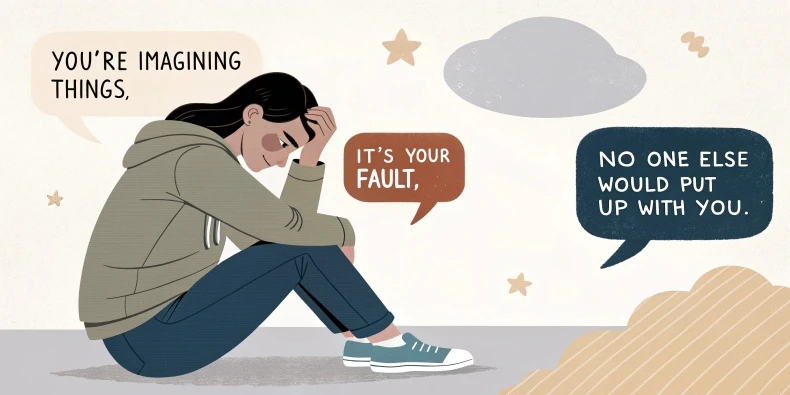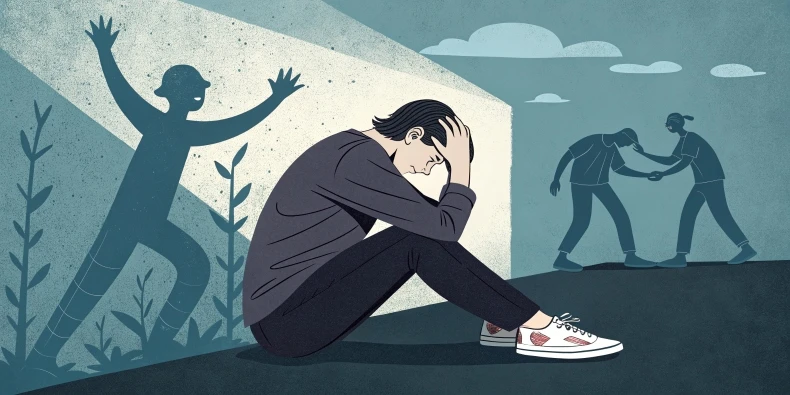People don’t become abusers instantly or because they simply choose to. It is a gradual process that begins with a deeply ingrained belief that they are superior to others. This belief manifests itself in controlling and manipulative behavior towards family members, friends, partner in a relationship, etc.
Abusers use a variety of tactics to control, most often loved ones, including emotional, financial, sexual, and physical abuse. They may also use threats, intimidation, and isolation to keep their victims under control.
Abusers fundamentally believe they have the right to control others. They view them as property or possessions to be used and abused at will. This twisted thinking is at the heart of all abuse.
Types of abuse
Abuse comes in many different manifestations. Therefore, it is categorized into four main types:
- Physical abuse: causing physical harm to another person.
- Emotional abuse: emotional abuse, insults that hurt.
- Financial abuser: a person who takes money from a loved one without permission or spends joint funds solely for his or her own needs without thinking of the partner or family.
- Verbal abuser: a person who uses words to hurt. For example, calling names, criticizing, yelling, threatening, or humiliating.
These four types of abusive behavior are the focus of this article, and each affects the victim differently.
A psychological profile of an abuser
What goes on in the abuser’s mind that motivates him or her to engage in abusive behavior? Can this be blamed on illness or attributed to the side effects of mental illness? In short, no. Mental illness does not cause violence. Plenty of people with mental illness do not commit violence against loved ones.
Abusers often share common psychological traits that you should be aware of when evaluating your environment. To understand the mindset of an abuser, let’s take a psychological profile of them.

They are intolerant
Intolerant people have no respect for other people’s opinions, views, or behavior. They are full of prejudices. This causes them to react aggressively, resentfully and uncaringly because abusers believe that there is no reason to prevent their own will from prevailing. They are prone to sexism.
In the beginning, they are charming
At the beginning of an acquaintance, such people are charming. Abusers know how to behave, and their true self may not reveal itself immediately. When trust in the other person increases, then they exhibit destructive behavior.
They are authoritarian
Abusers like order, but from a subjective point of view, that is, based on their personal criteria. It doesn’t matter if they are right or wrong, because if you don’t obey them, they get angry.
They are psychologically rigid
These people have a rigid mindset and pursue the only truth that is theirs. Abusers don’t dialog or seek consensus. They are afraid to give in to the opinions of others because they believe that only they are right. Anything that does not conform to their thinking is wrong.
Abusers, on the other hand, tend to think in relatively rigid and impenetrable categories, which allows them little empathy for others, even when there is reason to do so.
They possess dichotomous thinking
Being psychologically rigid, for them everything is either good or bad. There is no middle ground. In other words, everything is white or everything is black. This is because abusers have usually grown up in families where they were also treated the same way.
They are blackmailers
This type of person behaves in a self-interested and accusatory way, making the victim of blackmail feel uncomfortable and fearful. Abusers often make the victim feel guilty for something they did not do.
They do not engage in self-criticism
Because abusers believe that there is only one truth, they do not know how to appropriate criticism. This is because any criticism is taken as a rebuke to their personality and their way of interpreting reality. They do not consider the possibility that criticism can be a constructive contribution.
Abuse victims pay the price for abusers’ lack of social skills and sense of failure by becoming a scapegoat.
Psychological abusers do not engage in self-criticism – at least not systematically and until they are confronted with an experience that causes them to radically change the way they see the world.
They criticize
Even if these people don’t engage in self-criticism, they readily criticize others. Abusers look for the other person’s faults and emotionally overwhelm them with their weakness, and even invent a weakness to make the victim feel bad.
This is not constructive criticism, but an action to make someone feel bad in order to enjoy their reaction or subjugate them.
They have mood swings in seconds
Mood swings are common in these individuals, who can shift from a pleasant state to anger in a matter of seconds. Thus, they can live in two extremes – from charming to terrible people.
They are easily offended
These mood swings are often related to their hypersensitivity and the fact that they are often easily offended. As noted, if something does not align with the abuser’s views, they consider it wrong.
Isolation of the victim
Isolating the victim from family and friends is one of the goals for which the abuser forces the victim into total submission. The goal is to make the victim feel unsafe and cause fear of talking to other people.
They are cruel and insensitive
The abuser’s psychological cruelty usually extends not only to the victim, but also, for example, to their children and may even physically harm pets. These are cruel and insensitive people.
Abuser’s Phrases

Understanding the psychology of an abuser and what drives them is not enough to avoid their negative influence. They can skillfully manipulate and hide their intentions.
To learn how to quickly recognize the typical phrases of an abuser, you need to memorize their basic expressions that give away their true intentions. This will signal you to be careful with such a person.
These phrases can be used to control and manipulate you. Here are basic examples:
“I’m sorry, I’ll never do it again”.
This is a classic example of an abuser apologizing. He may say he is sorry, but he will never actually change his behavior. It’s a way of reassuring you and holding you back.
“You’re overreacting”.
This is another manipulative tactic the abuser uses. He is trying to insinuate that your feelings are invalid and that you are overreacting to his behavior. This is a way to make you doubt yourself and keep you under his control.
“You’re paranoid”.
A way to intimidate you and make you doubt your own perceptions. The abuser wants you to think you are paranoid or crazy, when in reality you are just seeing the abuse for what it is.
“You are impossible to please”.
Abusers use this phrase when their attempts to please aren’t met with sufficient appreciation or when they face criticism.
“Your friends don’t have your back like I do”.
The abuser benefits from isolating the victim from friends, family, and support people. That way, there will be no one around to witness the abusive behavior or help the victim safely end the relationship.
Abusers often discourage you from socializing with friends who they say do not have your best interests at heart and convince you to spend as much one-on-one time with them as possible.
“Why are you making a big deal out of this?”
An emotional abuser will ignore the problem and push it onto you.
“You don’t know what you’re talking about”.
This kind of abuser is also called a gaslighter. A gaslighter makes you question your own judgment, memories, and sense of reality. When you make an accusation based on something you’ve experienced, gaslighters will tell you that it never happened or that you have a bad memory.
“Everyone thinks you’re crazy”.
Once a gaslighter makes you doubt your own perception, it will convince you that other people think you’re mentally unstable too, which will further undermine your self-confidence.
It is important to remember that these abuser’s phrases are just a way of control and manipulation, so you should not put up with it.
Signs of an abuser
In addition to the basic signals in the form of phrases, the abuser can give away his behavior. Signs of an abusive relationship can be seen in a number of thought patterns and behaviors that may be overt or covert. Here are a few common abuser thought patterns to watch out for.
The abuser views you as an object rather than a person
The abuser may see you as something to be used and controlled, rather than as a person with your own thoughts and feelings. This can lead to him treating you as property rather than with love and respect.
The abuser believes that violence is acceptable
The abuser may believe that it is okay to use violence in a relationship – physical, emotional, or verbal. He or she may believe that violence is a normal and acceptable way to solve problems or express anger.
The abuser thinks he has the right to control you
The abuser may think that he has the right to control your life and that you are obliged to do what he says. He may think he knows what is best for you and that you should trust and obey him.
The abuser is insecure and feels threatened by you
The abuser may be insecure and perceive you as a threat to his ego. He may feel threatened by your success, independence, or ability to think for yourself.
The abuser is manipulative
The abuser may use manipulation techniques to control you. For example, gaslighting feelings of guilt or threatening to hurt yourself if you don’t do what he wants. He may also try to isolate you from friends and family or make you feel that you are crazy or overreacting.
How to recognize an abuser

To recognize an abuser, all you need to do is answer these questions:
- Does the person regularly belittle or criticize you?
- Does he or she try to control what you do, who you date, or where you go?
- Does he try to impose his point of view on everything?
- Is he excessively jealous of you or possessive?
- Does he threaten violence when he is angry with you (even if he hasn’t hurt you)?
- Has he ever harmed or threatened to harm others to intimidate you?
If any of the above sounds familiar to you, please seek help. No one deserves to be abused.



